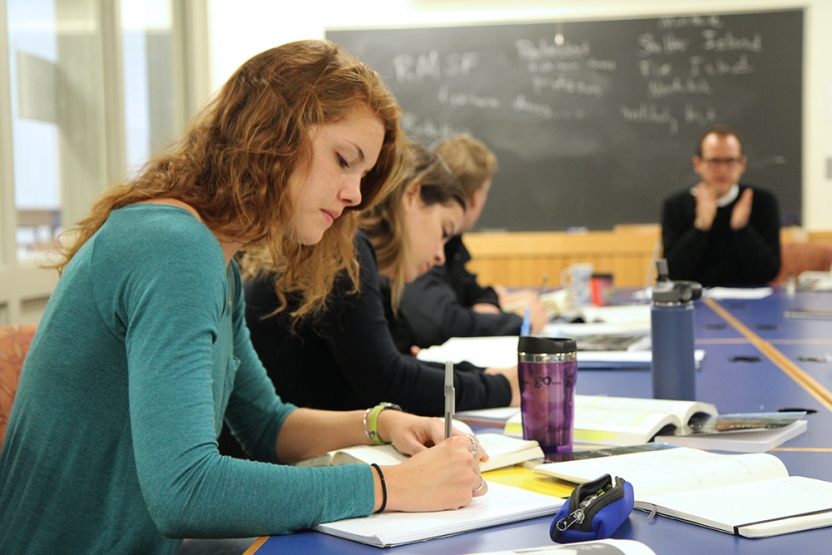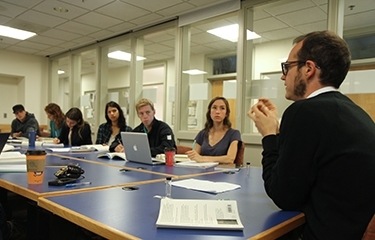From Animal Cognition to Wagner's Ring Cycle: Seminars Raise the Caliber of the Conversation

MIDDLEBURY, Vt. – It’s a Thursday morning in late September and the leaves are falling outside McCardell Bicentennial Hall. Meanwhile, inside Bi Hall the 12 students in ecologist David Allen’s first-year seminar are sitting around a conference table prepared to discuss Jonathan Edlow’s pivotal book, “Bull’s Eye: Unraveling the Medical Mystery of Lyme Disease.”
In plaid shirts and sweaters, with their laptops and notebooks open, the first years engage with their visiting assistant professor for the next 75 minutes about the “causative agent” of Lyme – the bacteria Borrelia burgdorferi – and how it was discovered. In the larger context, the course shows how medical mysteries are solved and how scientific inquiry advances our knowledge of the natural world.
Like their fellow first-years across campus this day, these students are getting their first taste of the interdisciplinary, flexible, and independent nature of academic inquiry at Middlebury College.
The seminar explores Lyme disease, which poses a threat in Vermont and throughout the Northeast, from the perspectives of biology, ecology, and public health. And since the bacterium is transmitted by ticks, specifically Ixodes scapularis, or “deer tick,” the seminar also looks at how the local environment has influenced its spread.
Why the sudden outbreak of this disease? Prof. Allen asks. Did the pathogen arrive in the U.S. from another country, was it always in North America, or did a change in the environment cause an ecological imbalance? The first-year students discuss the scientific evidence and conclude that the bacteria have been here for centuries. They postulate that an increase in the deer population – brought on by a decline in the number of natural predators and changes to the deer’s prime habitat – caused the predatory Ixodes scapularis to thrive.
|
“We considered how the ecological context could affect the epidemiology of the disease.” – Matt Lantin ‘18 |
In-class discussions like the conversation in Allen’s class are one of the reasons why veteran faculty such as Michael Kraus, the Dirks professor of political science, say the first-year seminar (FYS) program “is Middlebury at its best.”
“It creates overlapping structures of opportunity for faculty-student interactions that in turn benefit the ambiance of the classroom and raise the caliber of the conversation. I find the core value [of the FYS] to be the faculty’s ability to tap into the fresh energy and imagination of our first-year students, creating a whole that’s greater than the sum of its parts,” said Kraus, whose seminar this fall is called Transitional Justice: Reckoning with the Past.
First-year students enjoy the depth and structure of the FYS too. Matthew Lantin ’18, is intrigued by “the controversy over Lyme disease’s diagnosis, treatment, and prevalence. Since the bacterium is spread by a tick, we considered how the ecological context could affect the epidemiology of the disease.”

ys3-375.jpg” width=”375” height=”240” border=”0” />
Another first year, Read Katherine Allen (in photo, above right), says, “Everyone knows that Lyme is spread by ticks, but not everyone knows exactly how the bacteria move from the reservoir to the vector to the host. It’s really cool how the tiniest particles can have the most complex interactions and affect the human body in a major way.”
Each new student at Middlebury selects a seminar from a range of more than 45 choices – from Animal Cognition to Wagner’s Ring Cycle, and from Speechmaker’s Studio to Muslim Politics in the West. And with fewer than 16 students per section, the first-year seminar ensures close interaction with a faculty member (who also serves as the student’s advisor through the sophomore year) and establishes the College’s expectations in terms of writing, oral presentation, and keeping pace with their work.
The FYS provides “an intimate forum for fruitful dialogue and critical inquiry,” said Don Wyatt, the McCardell distinguished professor of history. “Most valuable of all, it socializes students in the vital art of being able to entertain, if not necessarily accept, the ideas and opinions of others that might differ from their own.” Wyatt is teaching The True Believer as a first-year seminar (FYS) this fall.
It’s evident that the quality of the conversation, the depth of the inquiry, and the confidence that comes from having a mentor in the first weeks and months of college are distinct benefits of the College’s FYS program.
Bettina Matthias, professor of German and director the German School, is offering Cultural History of the Piano this fall. It’s a seminar that “attracts a very self-selective group of students,” and she views the FYS program as “venues for like-minded people to find each other and develop a sense of social and intellectual belonging and identity at Middlebury.”
The first-year seminar, as one of the four courses taken by every incoming student, “provides a forum for a mindful personal transition into the academic community,” added Dan Brayton, associate professor of English and American literatures.
Brayton’s own seminar this fall, Fiction in Northern New England, is a case in point. With its focus on the cultural, economic, and social pressures that shape character in works by Elizabeth Strout and other authors, Brayton’s seminar empowers students “to exchange ideas freely with each other and with their professor, and to work on their writing deliberately and intensively.” In many ways it completes the transition from high school to college.
With reporting by Robert Keren and photos by Ben Savard

